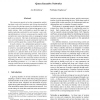294 search results - page 45 / 59 » The complexity of computing a Nash equilibrium |
LAWEB
2005
IEEE
15 years 7 months ago
2005
IEEE
The concurrent growth of on-line communities exhibiting large-scale social structure, and of large decentralized peer-to-peer file-sharing systems, has stimulated new interest in...
WICON
2008
15 years 2 months ago
2008
Much previous work has examined the wireless power control problem using tools from game theory, an economic concept which describes the behavior of interdependent but non-coopera...
141
click to vote
GLOBECOM
2009
IEEE
14 years 11 months ago
2009
IEEE
Primary user emulation attack in multichannel cognitive radio systems is discussed. An attacker is assumed to be able to send primary-user-like signals during spectrum sensing peri...
129
click to vote
CCS
2009
ACM
15 years 8 months ago
2009
ACM
In mobile networks, authentication is a required primitive of the majority of security protocols. However, an adversary can track the location of mobile nodes by monitoring pseudo...
ICDCS
2010
IEEE
15 years 5 months ago
2010
IEEE
—Aspnes et al [2] introduced an innovative game for modeling the containment of the spread of viruses and worms (security breaches) in a network. In this model, nodes choose to i...

